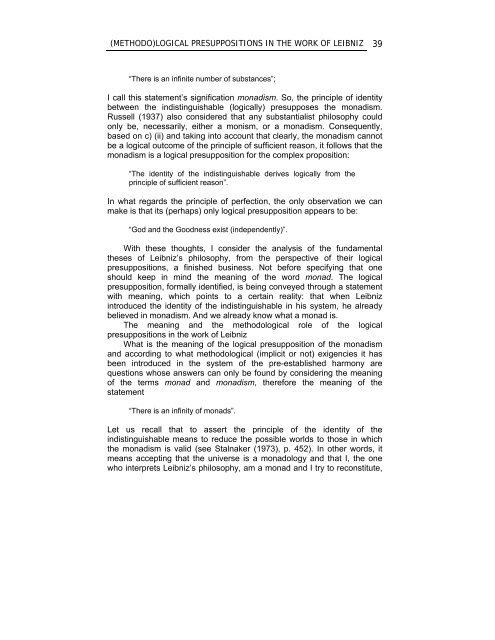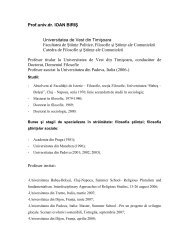analele universităţii de vest din timişoara annales universitatis ...
analele universităţii de vest din timişoara annales universitatis ...
analele universităţii de vest din timişoara annales universitatis ...
Create successful ePaper yourself
Turn your PDF publications into a flip-book with our unique Google optimized e-Paper software.
(METHODO)LOGICAL PRESUPPOSITIONS IN THE WORK OF LEIBNIZ 39<br />
“There is an infinite number of substances”;<br />
I call this statement’s signification monadism. So, the principle of i<strong>de</strong>ntity<br />
between the indistinguishable (logically) presupposes the monadism.<br />
Russell (1937) also consi<strong>de</strong>red that any substantialist philosophy could<br />
only be, necessarily, either a monism, or a monadism. Consequently,<br />
based on c) (ii) and taking into account that clearly, the monadism cannot<br />
be a logical outcome of the principle of sufficient reason, it follows that the<br />
monadism is a logical presupposition for the complex proposition:<br />
“The i<strong>de</strong>ntity of the indistinguishable <strong>de</strong>rives logically from the<br />
principle of sufficient reason”.<br />
In what regards the principle of perfection, the only observation we can<br />
make is that its (perhaps) only logical presupposition appears to be:<br />
“God and the Goodness exist (in<strong>de</strong>pen<strong>de</strong>ntly)”.<br />
With these thoughts, I consi<strong>de</strong>r the analysis of the fundamental<br />
theses of Leibniz’s philosophy, from the perspective of their logical<br />
presuppositions, a finished business. Not before specifying that one<br />
should keep in mind the meaning of the word monad. The logical<br />
presupposition, formally i<strong>de</strong>ntified, is being conveyed through a statement<br />
with meaning, which points to a certain reality: that when Leibniz<br />
introduced the i<strong>de</strong>ntity of the indistinguishable in his system, he already<br />
believed in monadism. And we already know what a monad is.<br />
The meaning and the methodological role of the logical<br />
presuppositions in the work of Leibniz<br />
What is the meaning of the logical presupposition of the monadism<br />
and accor<strong>din</strong>g to what methodological (implicit or not) exigencies it has<br />
been introduced in the system of the pre-established harmony are<br />
questions whose answers can only be found by consi<strong>de</strong>ring the meaning<br />
of the terms monad and monadism, therefore the meaning of the<br />
statement<br />
“There is an infinity of monads”.<br />
Let us recall that to assert the principle of the i<strong>de</strong>ntity of the<br />
indistinguishable means to reduce the possible worlds to those in which<br />
the monadism is valid (see Stalnaker (1973), p. 452). In other words, it<br />
means accepting that the universe is a monadology and that I, the one<br />
who interprets Leibniz’s philosophy, am a monad and I try to reconstitute,




